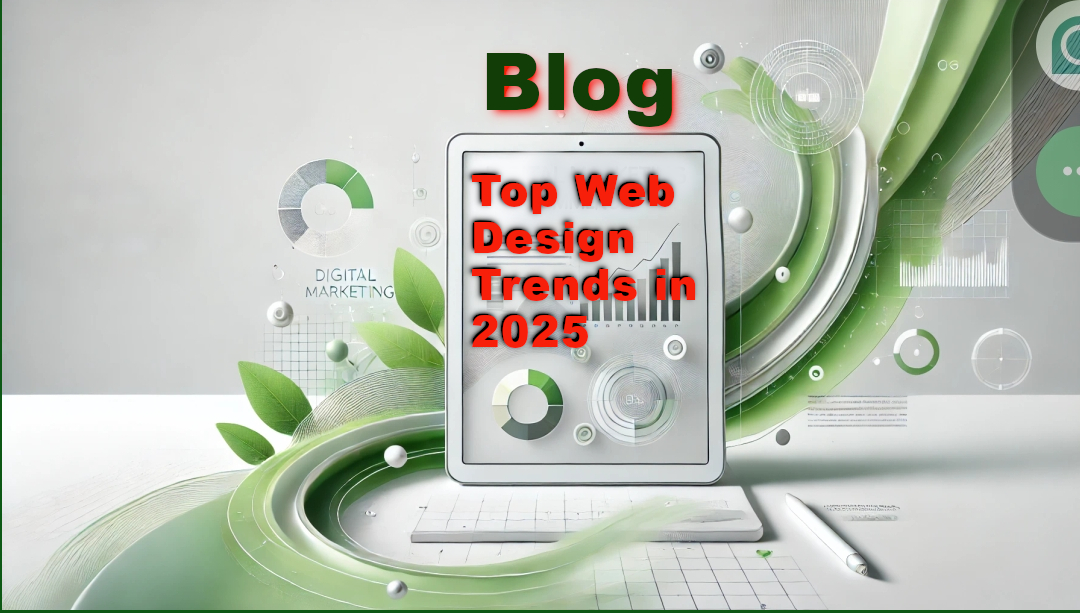Top Web Design Trends in 2025: What Businesses Need to Know
As technology and user expectations evolve, web design trends continue to shape the way businesses engage with their audiences. In 2025, several key trends are set to dominate, making websites more immersive, accessible, and efficient. Here’s what businesses should focus on to stay ahead.
1. AI-Powered Personalization
AI-driven website experiences are becoming the norm. Expect hyper-personalized interfaces that adapt in real-time based on user behavior, preferences, and data insights. AI chatbots and virtual assistants will also enhance customer support and engagement.
2. Minimalist and Ultra-Clean Designs
Simplicity remains key. Websites in 2025 will prioritize clean, minimalist aesthetics with ample white space, clear typography, and intuitive navigation. This not only improves user experience but also speeds up loading times.
3. Dark Mode and Adaptive Themes
With more users preferring dark mode for reduced eye strain, expect websites to offer seamless toggling between light and dark themes. Adaptive UI that adjusts based on ambient lighting will also become more common.
4. Voice and Gesture-Based Navigation
With the rise of smart assistants and touch-free interactions, websites will integrate voice search and gesture-based navigation, making browsing more accessible and interactive.
5. 3D and Immersive Web Experiences
Advancements in WebGL and augmented reality (AR) are enabling 3D elements and immersive storytelling. E-commerce and product showcase websites will particularly benefit from AR integration, allowing users to “try before they buy.”
6. Sustainable and Eco-Friendly Web Design
Green web design is gaining traction, with businesses optimizing websites for lower energy consumption. This includes efficient coding, minimal resource-heavy animations, and sustainable hosting solutions.
7. Enhanced Cybersecurity Measures
With increasing cyber threats, web security is more important than ever. Expect stronger encryption, biometric authentication, and AI-driven threat detection to be essential features of modern websites.
8. Micro-Interactions and Dynamic Animations
Subtle animations and micro-interactions will enhance user engagement, making web experiences more interactive and enjoyable without being overwhelming.
9. Mobile-First and Responsive Design
As mobile usage continues to rise, businesses must prioritize mobile-first design. Progressive Web Apps (PWAs) will also gain popularity, offering app-like experiences within browsers.
10. No-Code and Low-Code Development
The rise of no-code and low-code platforms will enable businesses to build sophisticated websites without extensive coding knowledge, making web development more accessible.
Staying updated with these trends will help businesses create engaging, future-proof websites that enhance user experience and drive success.
The Future of AI in Website Development and SEO
AI is revolutionizing website development and search engine optimization (SEO), making digital experiences more intelligent, efficient, and data-driven. Here’s a look at how AI will shape the future of websites and SEO in the coming years.
1. AI-Powered Website Builders
AI-driven platforms like Wix ADI and Bookmark AI are already simplifying web development. In the future, expect more advanced AI builders that generate fully functional, highly customized websites based on minimal user input.
2. Automated SEO Optimization
AI will analyze search trends, user intent, and website performance in real time to provide automated SEO recommendations. AI-powered tools will optimize meta tags, keyword placements, and content structures without manual intervention.
3. AI-Generated Content and Copywriting
AI tools like ChatGPT and Jasper are already assisting in content creation. In the future, AI will generate high-quality, SEO-optimized content, reducing the need for human writers while maintaining originality and relevance.
4. Voice Search and Conversational SEO
With voice assistants like Alexa and Google Assistant growing in popularity, websites will need to optimize for conversational queries. AI will help structure content to match natural speech patterns for better voice search rankings.
5. Predictive Analytics for SEO Strategy
AI-driven analytics will predict future trends, allowing businesses to adjust their SEO strategies proactively. By analyzing user behavior, search intent, and market shifts, AI can provide data-driven insights for content planning.
6. AI Chatbots for User Engagement
Advanced AI chatbots will handle customer queries, provide personalized recommendations, and even assist with purchases. This enhances user engagement and reduces bounce rates, indirectly improving SEO.
7. Automated Technical SEO Fixes
AI will help detect and fix technical SEO issues such as broken links, page speed optimization, and mobile usability. Automated tools will ensure websites stay optimized with minimal manual effort.
8. AI-Driven Image and Video SEO
AI-powered tools will optimize multimedia content by automatically generating alt texts, captions, and transcriptions. Image recognition and video analysis will help improve search engine rankings for visual content.
9. Personalized Search Results with AI
Search engines are becoming more intelligent, using AI to deliver highly personalized search results. Websites will need to focus on user experience and engagement to rank higher in AI-driven search algorithms.
10. AI-Powered A/B Testing and CRO
Conversion Rate Optimization (CRO) will be AI-driven, allowing businesses to test different website variations automatically. AI will analyze user behavior to determine the most effective layouts, CTAs, and content structures.
As AI continues to evolve, businesses that leverage its capabilities for website development and SEO will gain a competitive edge, ensuring better user experiences and higher search rankings.
Top Web Design Trends in 2025: What Businesses Need to Know
- TheeDigital highlights trends such as bold expressive fonts, anti-design embracing imperfection, and sustainable web design. theedigital.com
- Designmodo discusses immersive, user-centric, and innovative web design trends for 2025, including AI, AR, and 3D visuals. designmodo.com
- Squarespace Circle emphasizes trends like organic matter, vivid glow, and visual smiles in web design. pros.squarespace.com
The Future of AI in Website Development and SEO
- Matchbox Design Group explores how AI has revolutionized keyword research, content creation, and user experience by focusing on intent and personalization. Matchbox Design Group
- Vested Marketing discusses AI’s role in multichannel SEO strategies, enabling businesses to tailor content across various platforms and improve customer journeys. vested.marketing
- WebFX provides insights into how AI has impacted search and offers tips on thriving in the new AI and SEO landscape. WebFX
